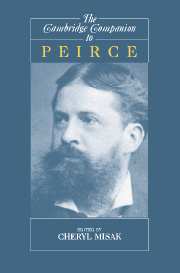Book contents
- Frontmatter
- 1 Charles Sanders Peirce (1839-1914)
- 2 Peirce's Place in Pragmatist Tradition
- 3 Peirce and Medieval Thought
- 4 Reflections on Inquiry and Truth Arising from Peirce's Method for the Fixation of Belief
- 5 Truth, Reality, and Convergence
- 6 C. S. Peirce on Vital Matters
- 7 Peirce's Common Sense Marriage of Religion and Science
- 8 Peirce's Pragmatic account of Perception
- 9 The Development of Peirce's Theory of Signs
- 10 Peirce's Semeiotic Model of the Mind
- 11 Beware of Syllogism
- 12 Peirce's deductive Logic
- Note on References
- Bibliography
- Index
11 - Beware of Syllogism
Statistical Reasoning and Conjecturing According to Peirce
Published online by Cambridge University Press: 28 May 2006
- Frontmatter
- 1 Charles Sanders Peirce (1839-1914)
- 2 Peirce's Place in Pragmatist Tradition
- 3 Peirce and Medieval Thought
- 4 Reflections on Inquiry and Truth Arising from Peirce's Method for the Fixation of Belief
- 5 Truth, Reality, and Convergence
- 6 C. S. Peirce on Vital Matters
- 7 Peirce's Common Sense Marriage of Religion and Science
- 8 Peirce's Pragmatic account of Perception
- 9 The Development of Peirce's Theory of Signs
- 10 Peirce's Semeiotic Model of the Mind
- 11 Beware of Syllogism
- 12 Peirce's deductive Logic
- Note on References
- Bibliography
- Index
Summary
PROBABLE DEDUCTION
Peirce wrote extensively on deduction, induction, and hypothesis beginning with the Harvard Lectures of 1865 and Lowell Lectures of 1866. The ideas that he examined in those early discussions were reworked over nearly two decades until the comprehensive statement of his view contained in “A Theory of Probable Inference” of 1883 that was included in the Studies in Logic, by the Members of the Johns Hopkins University and is reprinted in W 4, 408-450. This remarkable paper developed a version of the Neyman-Pearson account of confidence interval estimation that incorporated the main elements of the rationale offered for its adoption in the early 1930s and presented it as an account of inductive inference.
In his retrospective reflection on the question of induction in 1902 (CP 2.102), Peirce revealed satisfaction with the views on induction advanced in 1883 and this attitude is confirmed in other remarks from that period. However, Peirce did express dissatisfaction concerning his notion of “Hypothetic Inference.” Although Peirce called it Hypothetic Inference or Hypothesis from 1865 to 1883 and later, in 1902, Peirce replaced the term “Hypothesis” with “Abduction.”
In what I said about “Hypothetic Inference” I was an explorer upon untrodden ground. I committed, though I half corrected, a slight positive error, which is easily set right without essentially altering my position. But my capital error was a negative one, in not perceiving that, according to my own principles, the reasoning with which I was there dealing could not be the reasoning by which we are led to adopt a hypothesis, although I all but stated as much. But I was too much taken up in considering syllogistic forms and the doctrine logical extension and comprehension, both of which I made more fundamental than they really are. As long as I held that opinion, my conceptions of Abduction necessarily confused two different kinds of reasoning. (CP 2.102)
- Type
- Chapter
- Information
- The Cambridge Companion to Peirce , pp. 257 - 286Publisher: Cambridge University PressPrint publication year: 2004
- 1
- Cited by

